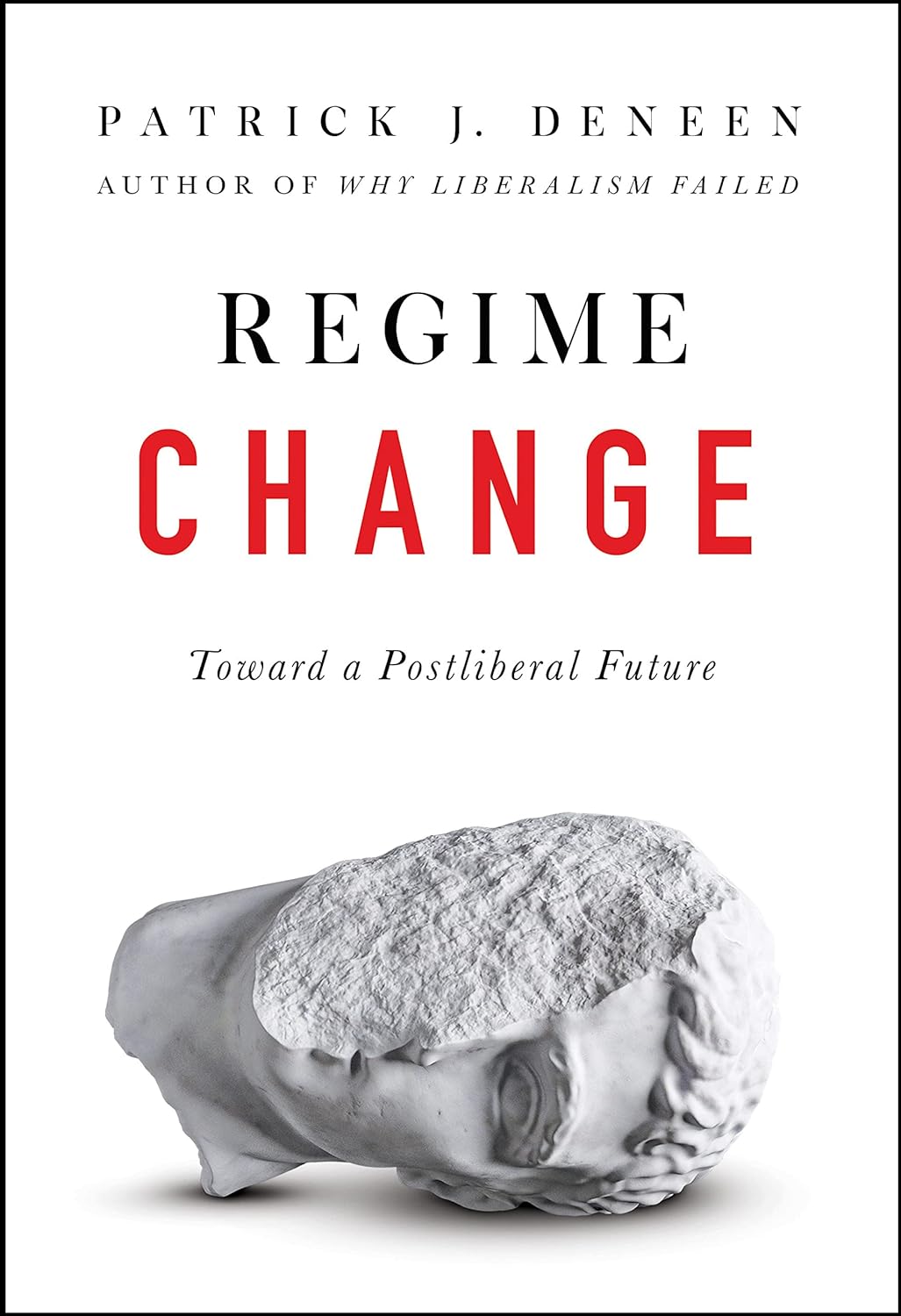For several months after Regime Change was published, Twitter was awash in reviews indicating that Patrick Deneen’s new book was “insidious and dangerous” (Los Angeles Review of Books), “chilling” (New York Times), and “absurd and perverse,” (Wall Street Journal), while First Things criticized him for not being theologically and ecclesiologically activist enough.
This critical ferment indicates that it’s a good time to write a book called Regime Change. Outside the country’s leading organs of news and commentary, much of the culture, from high art to pop novels and films, indicates uneasiness with existing systems. Dystopian storylines continue to dominate the young adult fiction market. An attempted regime change was a key plot point in last year’s blockbuster film Barbie. Recent polling indicates that nearly 65 percent of Americans think the country is on the wrong track, compared with just over 26 percent who think things are going well. For the past year or so, Americans have been overwhelmingly pessimistic about the future in general. Regime, power, the rise of a new elite, and competition between groups are hotly debated as people talk about what needs to change.
Deneen’s latest book is, in many ways, a continuation of the analysis in his 2018 book Why Liberalism Failed, which played a major role in ushering the term “postliberal” out of conclaves of Catholic intellectuals and into the larger conservative political sphere. Deneen does not back down from his controversial claim that liberalism was doomed from the outset; rather, in Regime Change, he attempts to chart a path forward for disillusioned Americans, Americans who recognize that the existing liberal order is flawed but do not want to turn to Marxism for solutions. In lieu of Marx, Deneen offers “common-good conservatism,” a regime that, he argues, favors the will of the fundamentally conservative people over the will of the liberal elite.
While he does plant a few signposts, Deneen offers less in the way of concrete political suggestion than elaboration on his earlier book, leaving readers with more questions than clear steps to take to bring about real change.
The basic argument of Regime Change will be familiar to readers of Why Liberalism Failed: political systems are necessarily composed of two groups—an elite and a populace—and the art of politics is to cultivate a system in which success for one of those groups depends upon the success of the other. The classic example of a balanced regime, Deneen recounts, comes to us à la Alexis de Tocqueville’s analysis in The Ancient Regime: feudalism. If, in a feudal society, the king loses the support of his lords, he loses his power (and, quite often, his life). If the lords, in their turn, lose the support of their vassals, either through tyranny or negligence, their own power decreases proportionally. This is, of course, how the feudal system works in theory. It often failed, but its failures came about exactly as the system predicted they would: a greedy lord tries to exploit his serfs and vassals and ends up with fallow fields, unmotivated men-at-arms, and borders open to attack from neighboring lords.
Deneen argues that twenty-first-century America is dealing with a very different relationship between the elite and the populace. The interests of elites, who are characterized by their wealth and status as part of a globalized, largely secular and progressive group, often run directly contrary to the interests of the populace. For example, it is in the best interest of elites for multi-national companies to grow and consolidate industry in one or two regions around the world; this makes manufacturing easier and cheaper and helps these companies and their shareholders (usually part of the elite) to earn more money. But for the populace, allowing multi-national companies to grow without control can be devastating. This growth can drive smaller manufacturers out of business, crushing communities that have grown up around these industries and leaving laborers out of work and trapped in depressed areas—often areas that hold deep familial ties for them, making it even more difficult for them to move away.
Deneen designates the contemporary ruling class a “managerial” elite, which he says creates an immediate conflict between the elite and the populace. Rather than using “traditionally forthright” power methods to control the populace, the elite views the people as a problem to be “managed” and governance as a series of HR situations to be navigated. So instead of compelling people through force, the elite has created an elaborate and ever-changing hierarchy of “identities,” and uses “perceived slights to identity” as the way to control the populace (and punish the recalcitrant).
After I finished the book, I wondered whether perhaps Deneen should have prescribed even more Machiavellian means towards his Aristotelian ends.
“The liberal political order has generated the form of elite most conforming to its core commitments of progress—placelessness, timelessness, and separation from cultural forms and practice,” Deneen writes. Even critics who decry Regime Change as incendiary would be hard-pressed to explain away this description of the elite (though some would protest his claim that their ascendancy is a natural result of the liberal order). The disagreement between the elite and the populace—and incidentally between global progressives and many conservatives—is, in many ways, one of principle: is “placelessness” a virtue or a vice? Is it better to be “separated from cultural forms” or closely linked?
The critical fury spent on the first half of Regime Change, in the end, reveals little more than the temperament and values of the reviewer. In the latter part of the book, however, Deneen begins to tackle practical questions. In a much-quoted phrase, Deneen calls for the use of “Machiavellian means to achieve Aristotelian ends.” These Aristotelian ends are, simply, a balanced regime, one in which the interests of the elite and the populace are aligned, so that when one flourishes the other does too.
“Machiavellian,” however, is a provocative descriptor, and Deneen no doubt knew that he would raise hackles simply by using the word. Pointing to the infamous creator of such phrases as “it is better to be feared than loved” as a model of action is a sure way to rile people. But, after I finished the book, I wondered whether perhaps Deneen should have prescribed even more Machiavellian means towards his Aristotelian ends.
Deneen suggests dramatically expanding the House of Representatives (he chooses the number 6,000, which sounds like a circus, albeit a more fun circus than the one we currently have). He advises common-good conservatives to “break up Washington, D.C.,” and separate out the centers of power among various other cities throughout the country. Some of his suggestions are entirely commonsensical: for example, requiring that the people who decide to fight wars to actually fight in those wars (one can’t help believing that U.S. foreign policy would look very different if it were the scion of the Bidens, Pelosis, Haleys, et al. headed to Ukraine).
Deneen’s ideas on these subjects are intriguing, but he rushes through this portion of the book; he spends much more time on the Aristotelian ends than on the means, and he does not lay out the path from the current situation to those ends. Or rather, he explains what he would like to see change, but he does not lay out a clear plan to create the environment in which those changes become possible. Creating environments for possible action is Machiavelli’s true gift; he knew just how to shape the atmosphere of a political community through coercion, manipulation, and careful coordination of efforts so that certain actions that were previously unpopular became not only acceptable, but desirable—or inevitable.
Some of Deneen’s ideas would solve several problems at once. He proposes tax incentive structures to dignify trade studies, encourage students to pursue trade careers, and find ways to bring even the budding elites into contact with trade work by requiring shop class and trade classes at every college. Not only would this go far towards reducing college debt (by giving students a valuable trade skill), but it would also offer a powerful corrective to a major philosophical problem: “Even a passing acquaintance with the work of electricians, plumbers, farmers, and carpenters could help correct the dominant ethos that all of reality is manipulable and human nature itself is malleable,” Deneen writes. This is an excellent point, but this section of Regime Change moves far too quickly. I found myself asking over and over, “Wonderful idea. But how?”
This same difficulty applies to Deneen’s other suggestions, including breaking up monopolies like the NCAA, Amazon, Google, Disney, and others that use their economic power to threaten state and local governments; encouraging and supporting manufacturing industries to cultivate a “society of producers” instead of our current “society of consumers”; banning porn and denouncing drug use for what it is: a “class advantage of the elite” that destroys the populace; and creating a cabinet position on marriage and family.
There should be an entire book on these ideas, with in-depth accounts of why each of these issues has arisen in America. It would also be useful to see examples of regions (nations, states, or even localities) that have been able to address these issues (more than just Hungary, please, which Deneen does mention—the situation in Hungary is so different from America that it provides little practical direction for conservatives in the United States).
Regime Change will clarify the impulses of Americans who are already convinced that the existing regime is fundamentally broken. It won’t convince anyone enamored of that regime, but it could move the needle for readers who sense a problem but haven’t named that problem.
Contra the critics who denounce the book as dangerous, Regime Change simply isn’t radical enough. Obviously, as Deneen says repeatedly throughout the book, regime change doesn’t entail violent uprising. Rather, a book on regime change needs to bridge the gap between the place common-good conservatives are now—a place of intellectual exploration—and the place where they can begin to act. Regime Change overleaps the gap, jumping straight to what should be done, but it does not show us how to create the circumstances in which they can begin to take action.
People should read Regime Change, particularly the last third, but the conversation should not stop there. Deneen should write another book, one that should lay out how this revolution will begin and what practical steps conservatives can take to prompt change; one that is, in fact, as revolutionary as some of his critics think this one is.















